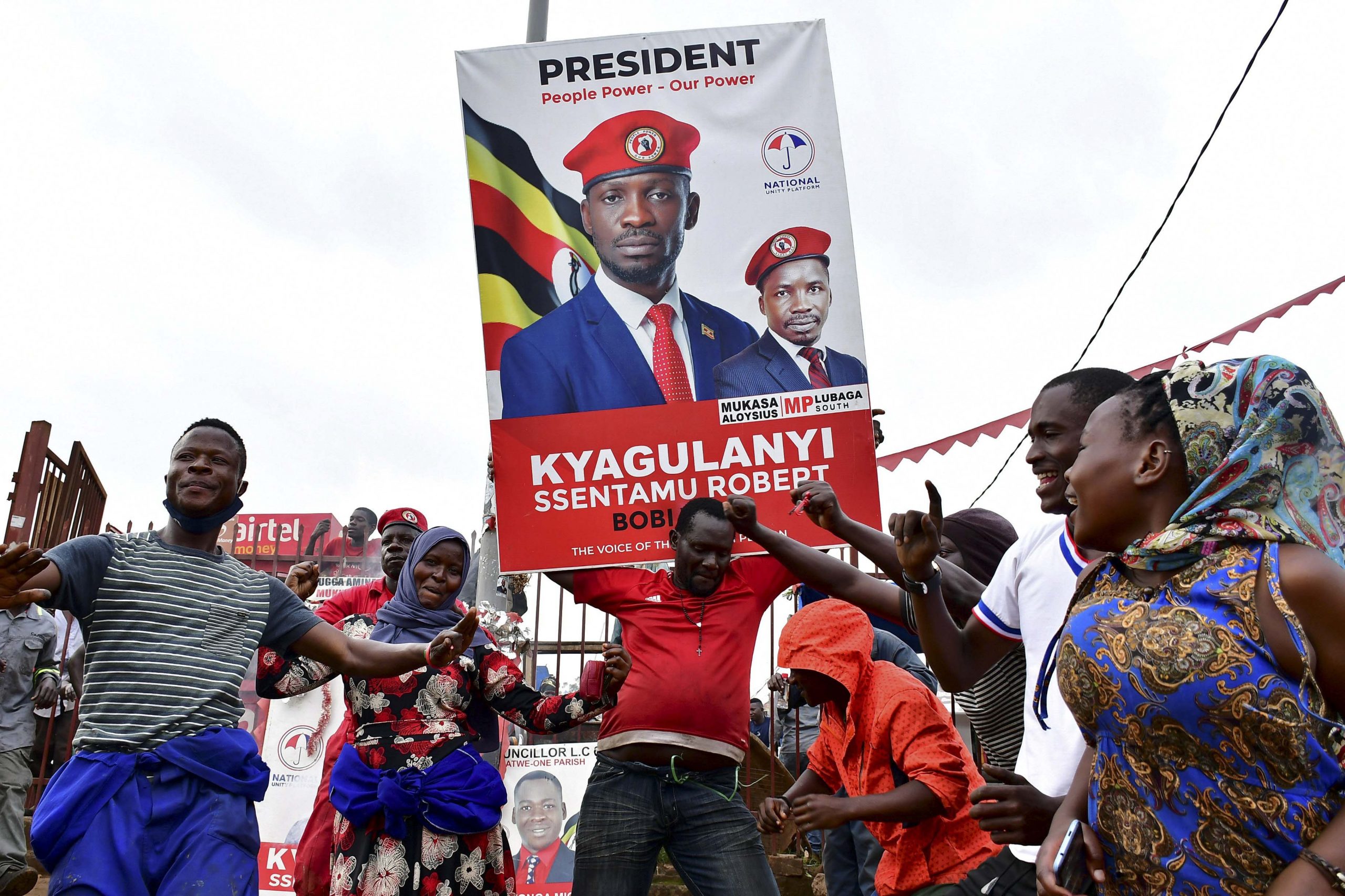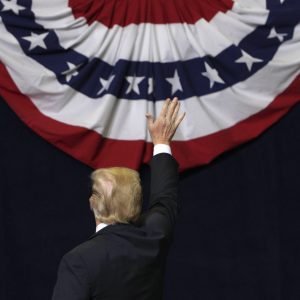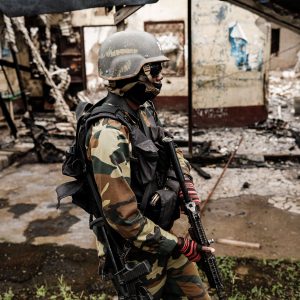Ugandans vote as Museveni wilfully clings to power
It could be a landmark election because of its potential impact on East Africa as well as the possibility of a youthful candidate taking over from a president who has been in power for 35 years.
Author:
14 January 2021

As Uganda headed to the polls in a general election on 14 January, fellow African countries and the international community were urged to hold President Yoweri Museveni accountable for the violence and human rights abuses committed against Ugandans.
Speaking during a Zoom panel discussion organised by Friends of the Congo, a non-governmental organisation based in Washington DC in the United States, journalist, author and publisher Milton Allimadi said: “Museveni has been the regional marshal for the West and they have ignored his hijackings for the past 35 years. This has led to an explosive situation.”
Allimadi, whose publication Black Star News co-sponsored the event, added that if Museveni was allowed to get away with rigging the election, the West would bear the responsibility for what happens afterwards.
Writer and journalist Helen Epstein said this was one of the most important elections for the Great Lakes region because ever since Museveni came to power, he had interfered in conflicts in and around his country, including “the war in northern Uganda which he skilfully prolonged … and meddling in South Sudan by arming both sides of the conflict. This election, which promises to be extremely badly rigged, is momentous,” she said.
Related article:
Uganda has not had a peaceful transfer of power since its independence from Britain in 1962.
Museveni and his National Resistance Movement (NRM) have ruled the country since 1986. Amendments to the Constitution reintroduced multiparty politics in 2005, but they also removed a limit on the number of terms a president may serve. This was followed by another amendment in 2017 that removed the age limit of under 75 for standing as a presidential candidate in an election, which cleared the way for Museveni to participate again in the 2021 round.
Museveni claims to be 76 years old, although many speculate that he may be lowering his age so that he can continue his political career.
Using Covid-19 as a smokescreen
There were wide-ranging reports that the 2016 election was marred by the governing party hampering freedoms of expression, association and assembly. Similarly, the run-up to this year’s election was riddled with arbitrary arrests, harassment of the opposition and suppression of campaigning, often in the name of Covid-19. Critics say the pandemic was used as a smokescreen to detain opposition leaders unfairly and selectively prevent their parties from campaigning or gathering for rallies.
While NRM candidates addressed voters at churches, and Museveni spoke to crowds of more than 200 supporters and engaged in electioneering without any consequence, opposition members and their supporters were dispersed with live ammunition, rubber bullets and beatings. Some were thrown in jail.
Related article:
Local and foreign journalists were also – and continue to be – at the receiving end of police brutality and harassment. According to The Independent Uganda, Ugandan police chief Martin Okoth Ochola said as recently as 8 January that reporters would be stopped from going to “where there is danger” by beating them.
He said it would be for their “own sake to help [them] understand” where not to go. The commissioner general of prisons, Johnson Byabashaija, said jails were ready to handle any increase in detainees. “There is always an upsurge of the prison population … after the elections,” Ochola said.
In an interview with New Frame, Ganzi Muhanguzi, a political analyst and adviser to the Ugandan party Alliance for National Transformation, said threats like these were not surprising. “If you have been here for a couple of years, the threat of beatings is not new. The regime has a casual relationship with the truth and a careless relationship with freedom of expression.”
Flawed justice
Muhanguzi said victims of state brutality could not count on the judicial system as it was also known to be under Museveni’s thumb. Only through media attention were some detainees released. “You have people whose cases are never heard and they are still in prison. People are arrested … and kept in prison without charge or bail release. What happens to the ordinary Ugandan who has no recourse [to justice]?”
The 2016 election results were disputed in the Supreme Court of Uganda by opposition presidential candidate Amama Mbabazi for a number of reasons, including voters being bribed. Not only were his lawyers’ files and computers stolen before affidavits were due to be submitted, but the court then ruled that there wasn’t enough evidence of irregularities.
Related article:
Also following that election, Kizza Besigye, the Forum for Democratic Change’s presidential candidate and a long-time opponent of Museveni, was placed under house arrest before being arrested and charged with treason.
Interviewed by New Frame, Jacky Kemigisa, a feminist journalist and researcher, said state institutions and the justice system had been bent to Museveni’s will. “The disrespect of law is something that happens… [Museveni] has deliberately crippled the institutions and elevated himself as the one who has to deal with them and retain power…
“Institutions model themselves around him and what he says. All institutions that are supposed to be independent belong to a particular party and the courts can’t be substantive,” she said.
The youth’s choice
Standing as presidential candidate for the National Unity Platform (NUP) is 38-year-old Bobi Wine, real name Robert Kyagulanyi Ssentamu, who is known as the “ghetto president”. The popular singer-turned-politician is a refreshing candidate for the youth who has only known one president. Wine started the People Power movement as a political pressure group and registered the NUP as its political wing in July last year.
“He is someone young that they can relate to, carving out a life for himself… He was successful in entertainment. He took a risk going into politics,” said Allimadi. In The Guardian, Nigerian literary icon Wole Soyinka referred to Wine as someone who “represents the spirit of Africa’s future”.
Wine was accused of flouting Covid-19 regulations after submitting his nomination forms to the country’s election body in November 2020. Protests broke out over his arrest and more than 50 people were killed and hundreds arrested. In a recent interview, Museveni said Wine was “confused because he is not ideological” and called him a manipulated “agent of foreign interest”.
On 30 December, the police detained Wine and members of his campaign staff in military barracks, which also sparked protests. Wine has nearly lost his life more than once, but others around him have not been so lucky, including his driver and a bodyguard.
In an unnerving video, Wine is seen dragged out of his car during an online press conference on 7 January about a petition to the International Criminal Court to investigate human rights abuses in Uganda. He loses network coverage while a gun goes off in the background, before returning to the screen with eyes streaming tears, explaining that he has been pepper-sprayed and tear-gassed by armed forces surrounding his car.
Kemigisa said the youthful population seeing the mistreatment of Wine was making them eager to vote for change. “What more would say ‘I want change’ than taking a bullet or protesting knowing that you could end up in jail… Younger people are being forced to take a stand. If you see someone being tear-gassed who is your age, you know it will happen to you too.”
Power of technology
Kemigisa said injustices were better documented because more people had access to smartphones and the internet, which meant the police could no longer simply break journalists’ phones and cameras.
Access to social media has already been shut down as a way of limiting real-time information being shared during this year’s election, but this is nothing new. Citing a threat to national security during the 2016 election, the Uganda Communications Commission jammed access to Facebook, Twitter and WhatsApp on polling day.
“[Museveni and the NRM] must win at all costs,” said Muhanguzi. “They are willing to bring the whole country to its knees. On election day, there will be people who will need to communicate with their loved ones where they are. They are scared that … people can record and send what’s happening across the country in real time.”
Related article:
Kemigisa explained that elite politicians, the army and police were basing their suppressive and violent actions on a history of colonial violence, meaning it should not be viewed through a contemporary frame but rather a historical one. The police and army had been created to ensure that Ugandans adhered to what their white colonial leaders wanted, she said.
“Whatever sham that is independence, these same institutions that have been used to violate Black people … that very same structure and violence is imported. You have a Black elite who are also inherently interested in capital, in protecting their own capital, in policing, and [they] have taken those same institutions like the army and slapped a black face on them,” said Kemigisa.
Too costly to participate
Kemigisa argued that even if a young person wanted to run for election, the electoral system in the country was heavily monetised and running for president was expensive. “Looking at our poverty stats and the level of unemployment, a lot of young people cannot afford this. They are not land owners, they cannot participate,” she said.
According to Kemigisa, an environment has also been created in which supporters expect money or handouts when a candidate is campaigning, and it has become the norm. “When you come to campaign, you have to give something. Some [MPs] don’t even go to their constituents because they know they have to give money. They pay for their children’s school fees. They own ambulances and donate to their constituents even during this pandemic. Their relationship is very much transactional.”
Related article:
Muhanguzi said no one believed the elections would be free and fair. “We have limited options when it comes to regime change. We can take the violent route and start a war of sorts … or participate in the electoral process, however rigged that is.”
He added that Ugandans needed to stand up for their freedom and make their voices heard, and expressed concern that the news was always dominated by violence and crackdowns during elections, instead of focusing on the manifestos of different political parties.
“We have a broken healthcare system, small economic growth, rich people are getting richer quite fast, and the poor who make up the large part are growing even poorer,” said Muhanguzi. “Not having a robust discussion cheats Ugandans of an informed decision on voting day. We need more focus on the agendas of presidential candidates.”





